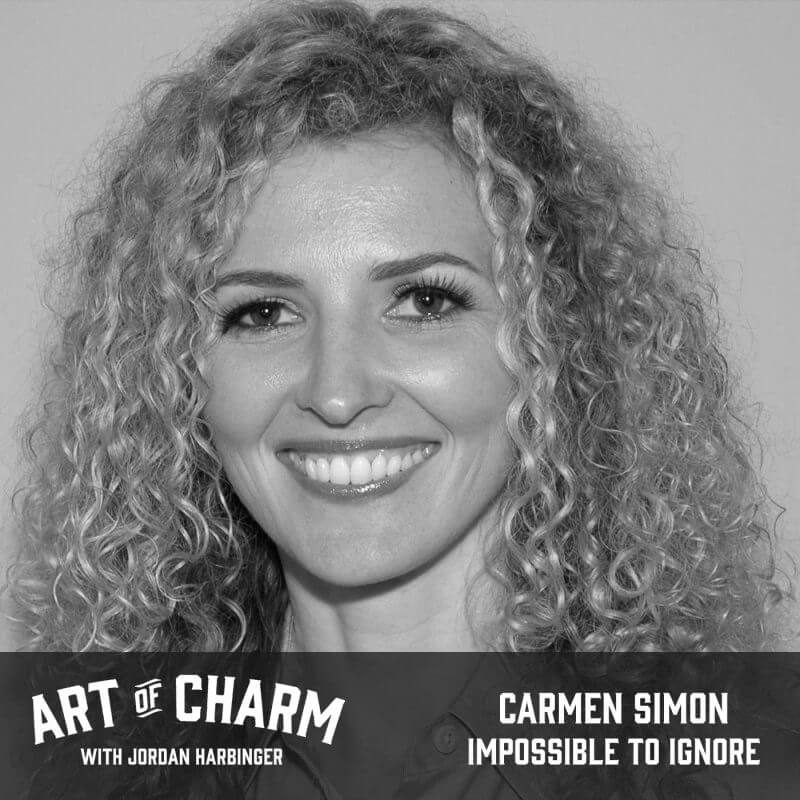Carmen Simon (@areyoumemorable) is a cognitive scientist specializing in neuroscience research and how we can use memory to have a positive impact on other people’s decisions. She is the author of Impossible to Ignore: Creating Memorable Content to Influence Decisions.
The Cheat Sheet:
- How to stay on people’s minds.
- How to influence other people’s memory.
- Why being remembered in the future is more important than being remembered in the past.
- When forgetting is actually better than remembering.
- How to influence others to forget.
- And so much more…
[aoc-subscribe]
What’s the use of being charming if people forget about you? Charm needs memory. It is important to investigate memory from the angle of influencing it in other people because memory is at the root of all decision-making.
Dr. Carmen Simon, author of Impossible to Ignore: Creating Memorable Content to Influence Decisions, joins us for episode 533 of The Art of Charm to show listeners a few techniques for staying on people’s minds.
More About This Show
When our brain is at the fork in the road where it’s making a decision, it goes in one of three ways, according to Dr. Carmen Simon, author of Impossible to Ignore: Creating Memorable Content to Influence Decisions — and they all involve memory. They are:
Pavlovian: Innate reflex prescribed genetically. “It doesn’t take a lot of training to realize that we shouldn’t touch hot surfaces,” says Carmen. We want to make decisions that preserve our biological fitness, and reflexive behavior makes this choice naturally — it’s a given.
Habitual: “If you repetitively don’t have breakfast, then the memory’s already ingrained through pure repetition,” says Carmen.
Goal-Oriented: This is the most conscious and strategic of the three. “You think about it, and then you decide to go one way or another.”
Knowing that memory is at the root of all decision making helps us control it for our own personal use — and in the service of other people. Carmen uses the example of trying to get someone to eat breakfast — even if they’re not in the habit of doing so.
“If you were to tell someone — or yourself — you can control the environment around you better when you eat, then that decision is almost a given,” Carmen says — demonstrating the reflexive, Pavlovian approach. “Or, if you already are eating habitually, then you already know that eating helps [Habitual]. Or if you’re thinking, ‘Okay, I have a very important meeting for which I need to think straight, therefore eating helps,’ then you might make that decision easier [Goal-Oriented]. And then sharing that information with somebody else, you’re starting to develop this persuasive behavior.”
Carmen believes that the strongest skill that any modern communicator can develop is the influence of other people’s memory. So finding ways to appeal to one (or more) of these three behaviors is key to nudging someone in the right direction to make good choices.
Think about trying to convince someone to go to the doctor because they’re sick.
Approaching from the Pavlovian, reflexive angle, you can appeal to the subject’s desire to feel better. We’re programmed for self-preservation, and this seems the most straightforward way to influence their decision. Still, some people are stubborn and this doesn’t always work.
Approaching from the Habitual angle, you might try to tie a visit to the doctor into regular errands they’re already running. “Linking the two eases the decision making,” says Carmen.
Approaching from the Goal-Oriented angle, perhaps you can remind the subject of some projects they need to finish. “Thinking about those influences decisions as well,” Carmen says.
“I have to point out that the difference between the three — reflexes, habits, and goals,” says Carmen. “The first two don’t take a lot of cognitive power. Whereas goals do. So especially when somebody’s sick, I would go for reflexes or habits versus making a person think too much!”
Listen to this episode of The Art of Charm in its entirety to learn more about why usually wide awake people fall asleep during presentations, why we should focus less on improving what we remember and more on influencing other people’s memories, the difference between retrospective memory and prospective memory, how to get people to remember us in the future (where decisions happen) rather than the past, what constitutes 60-80 percent of our memory problems, creating strong memory traces to stay on people’s minds, the advantages of forgetting, and lots more.
THANKS, CARMEN SIMON!
Resources from This Episode:
- Impossible to Ignore: Creating Memorable Content to Influence Decisions by Carmen Simon
- Memzy
- Dr. Carmen Simon at Twitter
- Michael Powers’ house at Half Moon Bay
- That Westin scent
- The Science of Making Your Story Memorable — Carmen Simon at Scott Adams’ blog
You’ll Also Like:
- The Art of Charm Challenge (click here or text 38470 in the US)
- The Art of Charm Bootcamps
- Best of The Art of Charm Podcast
- The Art of Charm Toolbox
- The Art of Charm Toolbox for Women
On your phone? Click here to write us a well-deserved iTunes review and help us outrank the riffraff!




